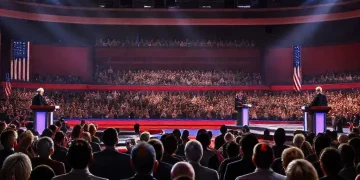Place political campaign focus on community engagement

Community engagement in political campaigns is essential for building trust, enhancing voter involvement, and addressing local issues through effective communication and strategic outreach efforts.
Place political campaign focus on engaging with communities is a vital strategy for fostering connections and boosting voter turnout. When voters feel heard and understood, they are more likely to participate in the democratic process. Let’s explore how to elevate this focus in your campaign.
Importance of community engagement in campaigns
Engaging with the community is essential for any political campaign. When campaigns actively involve local citizens, they create a strong bond that fosters trust and support. Community engagement helps candidates understand the needs and concerns of the electorate.
By prioritizing community engagement, candidates can develop targeted strategies to address local issues. This focus not only helps candidates connect with voters but also enhances their overall campaign effectiveness.
Benefits of Community Engagement
There are numerous advantages to placing emphasis on community interaction:
- Increased visibility and awareness of the campaign.
- Building a loyal support base through direct communication.
- Understanding voter priorities, which can inform policies.
- Encouraging higher voter turnout by motivating community members.
To maximize engagement, candidates should create opportunities for open dialogue. Town halls, community forums, and social media platforms are effective venues for reaching out. By listening to constituents, candidates can address pressing issues, such as education, healthcare, and public safety. It’s crucial to demonstrate that their voices matter.
Strategies for Effective Engagement
Implementing strategic actions enhances the effectiveness of community engagement. Consider these approaches:
- Host regular events to maintain connection with constituents.
- Utilize social media to share updates and engage in discussions.
- Collaborate with local organizations to reach a broader audience.
Moreover, responding promptly to community feedback shows that a candidate values their input. This creates an environment where voters feel empowered to share their ideas and concerns. Ultimately, community engagement is a vital component that can make or break a political campaign. By fostering a strong relationship with constituents, candidates can not only achieve electoral success but also promote a healthier democratic process.
Strategies to enhance political campaign focus
Enhancing a political campaign’s focus is crucial for a successful outreach. Effective strategies can significantly boost engagement and voter interest. Political campaigns must prioritize tactics that resonate with constituents and address their needs.
One key strategy is to establish clear messaging. Candidates should communicate their core values and positions in a way that is easy to understand. This clarity helps voters relate to the candidate and fosters trust. For instance, consistent visibility across various platforms strengthens message retention.
Effective Communication Channels
To enhance focus, campaigns should utilize diverse communication channels:
- Email newsletters for regular updates and insights.
- Social media to engage with voters directly.
- Community events to foster personal connections.
Each channel offers unique opportunities to share important information and gather feedback. Social media platforms allow campaigns to interact with a broader audience, enhancing engagement through comments and shares. Concurrently, local events enable a more personal touch, allowing candidates to hear concerns firsthand.
Tailoring Campaign Strategies
Another important aspect is to tailor campaign strategies based on audience feedback. By analyzing data from surveys and social media interactions, campaigns can adjust their approach to fit the community’s needs better. Listening to constituents demonstrates that the campaign values their opinions and promotes a sense of involvement.
Incorporating innovative tactics, such as engaging videos or interactive polls, can also attract attention. Ensuring that the message is relatable to the specific demographics of the audience is vital. Personal stories and local issues should be emphasized to strengthen the connection.
Overall, implementing these strategies allows a campaign to maintain a focused approach. By embracing modern communication methods and being receptive to voter feedback, political campaigns can enhance their overall effectiveness and build stronger connections with their audience.
How digital media shapes campaign engagement

In today’s political landscape, digital media plays a crucial role in shaping campaign engagement. With more voters online than ever, candidates must harness this potential to connect with their audience effectively.
Social media platforms like Facebook, Twitter, and Instagram allow campaigns to reach a wider audience quickly. These tools enable candidates to share their messages, respond to voter concerns, and adapt to trends in real time. It is essential for campaigns to maintain an active presence on these platforms to engage younger voters who primarily consume content digitally.
Effective Use of Online Platforms
Several strategies can enhance engagement through digital media:
- Create shareable content, such as infographics or short videos.
- Utilize live streaming for events to foster real-time interaction.
- Engage followers by asking questions and encouraging discussions.
These tactics encourage followers to participate actively and feel connected to the campaign. For instance, sharing behind-the-scenes content can humanize candidates and create a relatable image, making voters more inclined to support them.
Data-Driven Insights
Another significant advantage of digital media is the ability to analyze voter behavior and preferences. Campaigns can utilize analytics tools to track which posts generate the most engagement, allowing them to fine-tune their approaches. This data-driven strategy enables candidates to focus on what resonates with their audience, ensuring that their messaging is effective and relevant.
Moreover, email campaigns remain an integral part of digital engagement. By sending targeted messages to specific demographics, campaigns can keep voters informed about events and issues that matter to them. This personal touch helps build and maintain relationships, inviting voters to become more involved.
In summary, adapting to the digital landscape is vital for political campaigns aiming to boost engagement. By leveraging social media and data insights, candidates can create dynamic connections with voters, ensuring their voices are heard in the electoral process.
Case studies of effective community engagement
Case studies of effective community engagement provide valuable insights into how political campaigns can connect with voters. Learning from successful examples is essential for creating strategies that resonate with the electorate.
One notable example is the campaign of a local mayor who prioritized town hall meetings. By organizing regular events, the candidate was able to foster open dialogue with residents. This approach not only boosted the candidate’s visibility but also created a platform for constituents to voice their concerns and ideas. Voters felt more involved in the political process, which increased their support for the candidate.
Successful Use of Technology
Another effective case study involved a congressional campaign that utilized social media to engage younger voters. The campaign launched an interactive series of Instagram stories where followers could participate in polls and share their opinions on key issues. This strategy not only increased engagement but also provided the campaign with insights into the priorities of younger constituents. As a result, the candidate tailored their messaging to address these concerns directly.
Partnerships with Local Organizations
Connecting with local organizations can also enhance community engagement. A state-level campaign partnered with a local nonprofit focused on education. By collaborating on community events and discussions, the candidate raised awareness about educational policies and how they impacted local families. This partnership highlighted the candidate’s commitment to education, improving their reputation within the community.
Each of these case studies emphasizes the importance of genuine interaction and responsiveness. Successful campaigns demonstrate that taking the time to engage with the community leads to more informed voters and stronger connections. By analyzing these examples, other campaigns can develop their strategies to enhance engagement and build lasting relationships with constituents.
Potential challenges in political campaigns
Political campaigns often face various challenges that can impact their effectiveness. Understanding these potential challenges is crucial for strategizing and adapting approaches throughout the election cycle.
One significant challenge is dealing with negative publicity. Campaigns can quickly become the target of unfavorable media coverage or attack ads from opponents. This situation requires swift and effective communication responses to address misinformation and regain voter trust. Transparency and accountability become vital in such scenarios.
Voter Apathy
Another major hurdle is voter apathy. Many potential voters may not feel motivated to participate in elections due to various reasons, such as dissatisfaction with candidates or feeling that their vote does not matter. Campaigns must work hard to energize and engage voters, showing them the importance of their involvement in the democratic process.
Limited Resources
Resources are often limited, which can strain campaign operations. Budget constraints may restrict advertising and outreach efforts, making it challenging to reach potential supporters. Campaigns need to prioritize their resources effectively, focusing on high-impact strategies to maximize their outreach.
In addition, technology can present challenges. With the ever-changing landscape of digital media, campaigns must stay updated on the latest trends and platforms. Failing to adapt to new technologies can lead to missed opportunities for engagement. Therefore, investing in digital literacy and training for campaign staff can be essential for navigating these challenges.
Finally, internal coordination challenges can arise as well. Campaign teams must work seamlessly to ensure that messaging is consistent and aligned across various platforms. Fragmentation in communication or disagreements within the team can weaken the campaign’s overall effectiveness.
Overcoming these challenges requires a proactive approach, constant adaptation, and a strong focus on community engagement. By recognizing and addressing these potential obstacles, political campaigns can increase their chances of success.
FAQ – Community Engagement in Political Campaigns
Why is community engagement important in political campaigns?
Community engagement helps build trust between candidates and voters, creating a sense of involvement that can boost voter turnout.
What are some effective strategies for engaging with the community?
Effective strategies include hosting town hall meetings, utilizing social media for direct communication, and partnering with local organizations.
How can negative publicity impact a political campaign?
Negative publicity can damage a candidate’s reputation, making it crucial to respond swiftly and transparently to regain voter trust.
What role does digital media play in campaign engagement?
Digital media allows campaigns to reach a wider audience quickly, facilitating interaction and providing valuable insights through data analytics.





